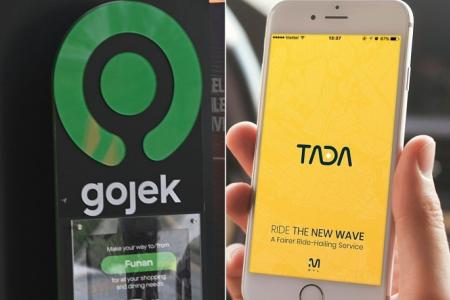Gojek and Tada to raise platform fees by up to 50c per trip
Passengers who use ride-hailing apps Gojek and Tada will pay more per trip from next year when the two operators hike platform fees, a move that they say is meant to cover costs arising from the upcoming Platform Workers Act.
Gojek, the second largest ride-hailing operator here, will raise its platform fee by 30 to 50 cents per journey starting from Jan 1, 2025. This is up from the current 60 cents to $1.00 per trip.
The operator, which announced this on its website, said the revised platform fee will range from 90 cents to $1.50 for every trip.
Similarly, Tada said in an email to its customers in the morning of Dec 24 that it would raise its platform fee by 50 cents, before goods and services tax. This means that its platform fee will go up from the current range of 55 to 75 cents, to a new range of $1.05 to $1.25 from Jan 1, 2025, before goods and service tax.
Tada also announced an extension of its driver’s fee charge of $0.50 to $0.80 beyond Dec 31, 2024, to Jun 30, 2025. This fee will be credited entirely to drivers to help offset their operating costs.
Both operators attributed the fee hike to the upcoming Platform Workers Act, which was passed by Parliament in September, and will come into force in January 2025. The new law provides greater labour protections for private-hire car drivers, cabbies and delivery workers who rely on these online matching platforms for their work.
In a notice posted on its website on Dec 20, Gojek said this fee hike is intended to “protect (drivers’) earnings” in support of the new law.
It added that the fee, which is automatically charged to customers upon booking, will be used for initiatives to improve and maintain Gojek’s ride-hailing services for all users.
This platform fee is calculated based on factors such as the distance travelled and duration, to ensure that prices remain fair and competitive for both customers and drivers, said Gojek.
Tada said its platform fee adjustment is required to maintain current app features and develop new ones to improve customers’ ride-hailing experience, as well as to support the roll-out of the new Platform Workers Act.
It added that it will provide its drivers with comprehensive insurance coverage and contribute to the Central Provident Fund (CPF) accounts of eligible drivers.
“These measures provide greater financial security for our driver-partners and demonstrate our commitment to being a responsible and progressive platform operator,” said Tada.
Recognising the vital role platform workers play in Singapore’s economy, Tada added that it is committed to supporting their livelihoods as they adapt to changes arising from the new act.
The Straits Times has asked Grab and the other ride-hailing platforms if they also have plans to raise their platform fees.
Under the new Platform Workers Act, platform companies will be required to contribute more to the CPF accounts of younger platform workers.
Platform operators will start with contributing 3.5 per cent of a worker’s net earnings in 2025, and go up incrementally to match what employers of companies that are not ride-hailing or delivery firms contribute in 2029.
These higher CPF rates will be compulsory for younger platform workers born on or after Jan 1, 1995, and optional for older workers.
The law also makes it mandatory for all platform operators to provide platform workers with work injury compensation insurance with the same level of coverage as employees.
The Ministry of Manpower said on Dec 17 that more than 8,000 platform workers have opted in for higher CPF contributions under the Platform Workers Act since Nov 1.
Get The New Paper on your phone with the free TNP app. Download from the Apple App Store or Google Play Store now


